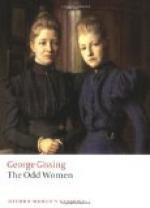Free as he boasted himself from lover’s silliness, he had magnified Rhoda’s image. She was not the glorious rebel he had pictured. Like any other woman, she mistrusted her love without the sanction of society. Well, that was something relinquished, lost. Marriage would after all be a compromise. He had not found his ideal—though in these days it assuredly existed.
* * *
And Rhoda, sitting late in the little lodging-house parlour, visited her soul with questionings no less troublesome. Everard was not satisfied with her. He had yielded, perhaps more than half contemptuously, to what he thought a feminine weakness. In going with her to the registrar’s office he would feel himself to be acting an ignoble part. Was it not a bad beginning to rule him against his conscience?
She had triumphed splendidly. In the world’s eye this marriage of hers was far better than any she could reasonably have hoped, and her heart approved it with rapture. At a stage in life when she had sternly reconciled herself never to know a man’s love, this love had sought her with passionate persistency of which even a beautiful young girl might feel proud. She had no beauty; she was loved for her mind, her very self. But must not Everard’s conception of her have suffered? In winning her had he obtained the woman of his desire?
Why was she not more politic? Would it not have been possible to gratify him, and yet to gain his consent to legal marriage? By first of all complying she would have seemed to confirm all he believed of her; and then, his ardour at height, how simple to point out to him—without entreaty, without show of much concern—that by neglecting formalities they gained absolutely nothing. Artifice of that kind was perhaps demanded by the mere circumstances. Possibly he himself would have welcomed it—after the grateful sense of inspiring such complete devotion. It is the woman’s part to exercise tact; she had proved herself lamentably deficient in that quality.
To-morrow she must study his manner. If she discerned any serious change, any grave indication of disappointment—
What was her life to be? At first they would travel together; but before long it might be necessary to have a settled home, and what then would be her social position, her duties and pleasures? Housekeeping, mere domesticities, could never occupy her for more than the smallest possible part of each day. Having lost one purpose in life, dignified, absorbing, likely to extend its sphere as time went on, what other could she hope to substitute for it?
Love of husband—perhaps of child. There must be more than that. Rhoda did not deceive herself as to the requirements of her nature. Practical activity in some intellectual undertaking; a share—nay, leadership—in some “movement;” contact with the revolutionary life of her time—the impulses of her heart once satisfied, these things would again claim her.




